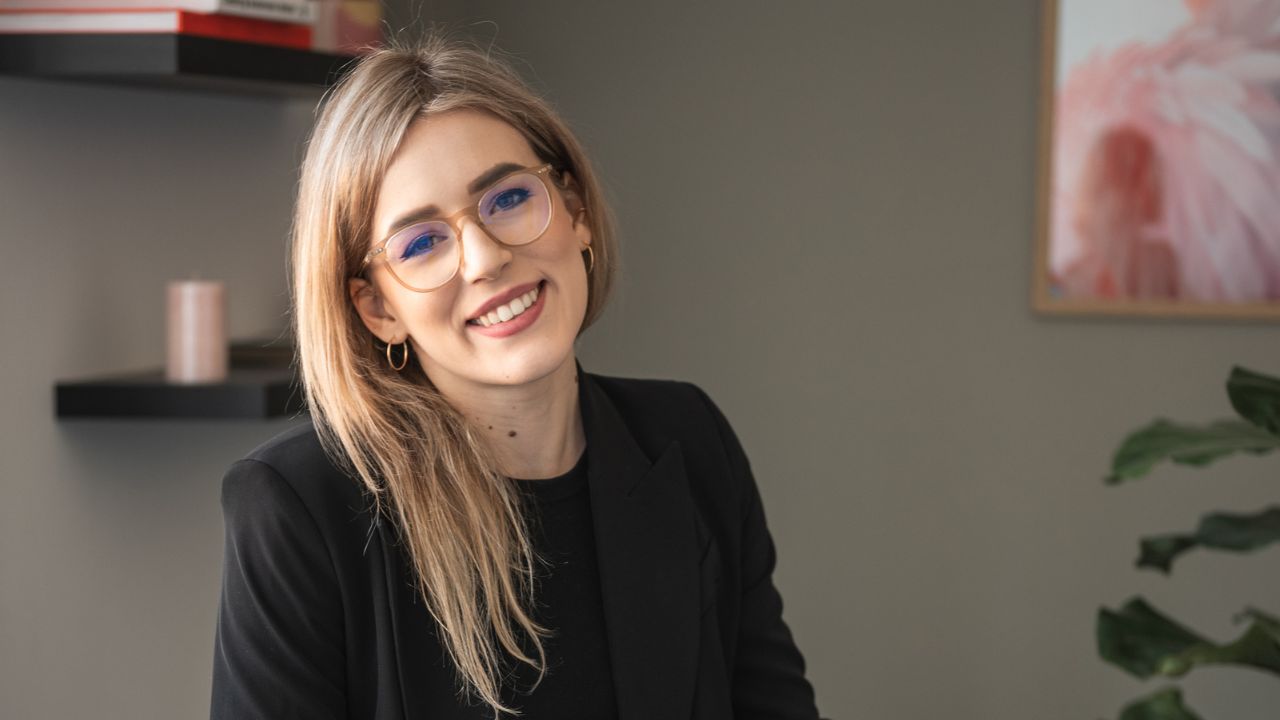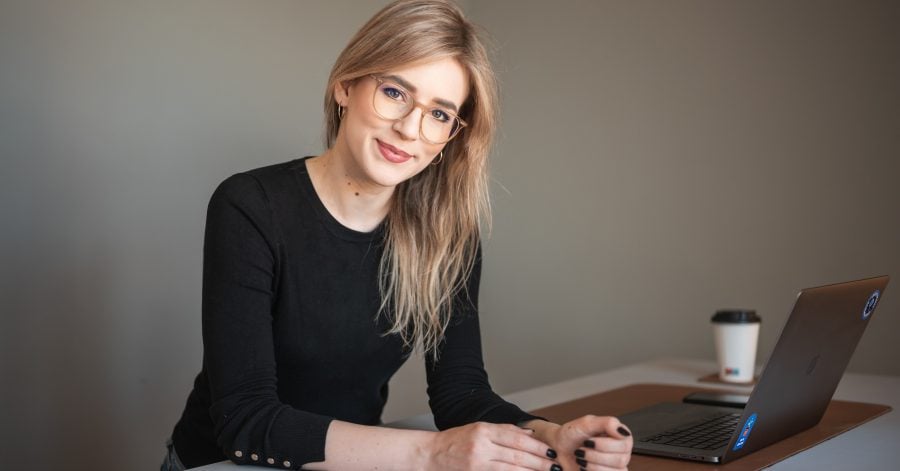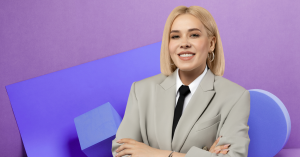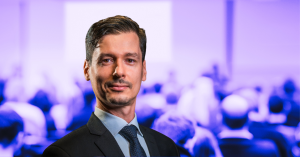Can you think of a TEDx talk that stuck with you and even inspired a creative idea down the road? Raul Popa, the co-founder and CEO of TypingDNA, a startup with Romanian DNA that recognizes people by the way they type, gave a speech about the next wave of innovation in Oradea in 2016. His idea inspired our lady of the day, Flavia Sana, now Head of Design at the startup.
The 24-year-old has been with the company since 2017. During this time, TypingDNA raised over €8M to prevent unauthorized computer usage with their personalized authentication solution. Flavia Sana applied for a Web Designer position and went up the ladder to Design Manager and Head of Design.
Today, we get to discover more about this Generation Z Women in Tech member’s background in computer science, her journey in the tech world, and her view on success, resilience, learning, and design.
The Recursive: Tell us about your Women in Tech path so far and how did you land your current job?
Flavia Sana: My career has been at the intersection of 1) amazing people that have shaped me and genuinely invested in my development, and 2) my capacity to be consistently driven towards learning.
The journey started with a friend who gave me his savings to buy a computer so I could start practicing design.
I was lucky to be drawn to design from the beginning and knew what I wanted to do — something visual, creative, and technology-related. During high school, I started taking different graphic design projects for free, so I could put my new skills to work.
Most of my colleagues went down the programming path, but combining technology with art felt unrealistic and naive. At university, I got impatient and wanted to land a hands-on job.
When I saw that TypingDNA had a web developer position, I went for it. Even though I was confident that I could learn and adapt, I had no expectations of getting the job due to my lack of experience in development.
I also had zero clue about what working at a startup would entail — not to mention jumping into a foreign industry of biometrics, authentication, or anything cybersecurity related. Though I had feared it at the time, it was one of the best decisions.
In the beginning, we were five people in the office and had a focused environment, lots of coffee, and inspiring sessions around the whiteboard. I was shy and barely said anything most days.
Looking back, I guess that also contributed to my sponge-like learning. At that early stage in a startup, you’re wearing multiple hats and do whatever’s needed to build a foundation. Then, as the startup grows, you get to go more in-depth and develop your talents in more specific areas.
These days, I’m leading the creative and design department while focusing on my UI/UX craft and closely working with the development team to bring our creatives to life.
How would you explain to a 7-year-old what your design job is?
Just like no two people have the same fingerprint, at TypingDNA, we figured out that no two people can type on a keyboard in quite the same way. So we built this technology that uses your unique typing style as a “digital fingerprint” to make sure that only you can get into your account.
I spend my days creating marketing and design experiences alongside my incredible team to tell the story of TypingDNA and show the world how our products can keep people safe.
What is it like to work for TypingDNA and what do you like most about their culture?
TypingDNA is a place for people who want ownership and responsibility while working on something that has a global impact. It’s been a journey full of growth and challenges that only helped me get better — personally and professionally.
It’s a place that celebrates initiative and out-of-the-box thinking. Seeing how things evolve from a simple idea in a meeting to a fully fleshed-out experience is what motivates me.
What does a day in the life of a Generation Z member look like? Tell us something we don’t know about the field you’re working in as a woman in tech.
Every day is full of learning, and you have to be open, flexible, and curious. Even though I’m now Head of Design, I still get to be in the weeds — splitting my day between hands-on creative work and managing design reviews and collaboration.
I aim to stay organized, creating order in most things, so I can leave space for imagination and problem-solving.
One of the beautiful perks that startup life gives you as a creative is that you can just DO something, without the pressure of it being 100% perfect. The goal of a startup is to get many experiments out the door, learn from the feedback, and then go back and make it better instead of striving for perfection right away. This habit helped me grow.
How has it been developing in your field in Oradea, Romania? What can you share about the local tech ecosystem?
I think Oradea was the right place to be, and I’m grateful for that. Besides TypingDNA, some other growing startups were born here, like Cartloop, Paymo, Flipsnack, and others. The local tech ecosystem is pretty much created by Oradea Tech Hub — they’re truly making a difference with their startup incubator and tech-related initiatives.
What is your definition of success as a Generation Z member?
That I can use my resources to make a difference in someone else’s life while nurturing relationships and sharing great experiences. I think my daily satisfaction comes from being of service with what I’ve been given, working on my craft, myself, and being present in the moment. Practicing daily gratitude has helped me see that life is all about those simple present moments — they’re what define success.

What do you think makes you good at what you do?
The fact that I’m driven and I genuinely care about what I’ve been entrusted with. I am also self-aware, and I analyze where I stand, what my blind spots are, and what I need to work on to keep adding more value.
Growth comes from embracing uncertainty and learning from others who see things differently from you.
How has technology shaped your career?
Technology excites me, and I’ve always been curious about it. Working in a tech startup has exposed me to this exciting world full of brilliant people trying to solve problems through innovation. And now I’m so into it that I couldn’t see myself doing something that’s not tech-related.
What are your professional goals for this year?
I don’t have measurable goals per se, but I know what I want to get better at. I’m striving to keep improving my process and be open to new ideas and mediums that bring novelty to the user experience. One of my other intentions is to take time to give back from what I’ve learned and experienced — sharing and contributing to the global design community.
How do you cope with stressful periods at work?
You get better at embracing stress rather than trying to avoid it.
After multiple product releases and events, you’re building resilience and getting to know your triggers. The one thing that helps me is writing down precisely what stresses me, and it all feels easier afterward. We usually worry about things we cannot control, and that’s important to notice so you can take charge of your stressors and use them to your advantage.
What is your motivator during not-so-productive days?
Hands down that would be my team at TypingDNA. Knowing we’re so codependent on each other motivates me to show up and keep improving. I focus on what I have to do to move things forward. Momentum builds up like a snowball: you get into the rhythm, and slowly but surely, things begin to flow.
From remote work, through automation, a 4-day working week, to universal basic income, how do you imagine the future of work?
I thrive on face-to-face interaction and going to the office to meet my teammates a few times each week is amazing. But even when we’re all working remotely, I’ve learned that one-on-ones can be as special online as long as you’re fully present.
On the topic of 4-day working weeks, I did try to work 4 days/per week, and used my fifth day for learning and reflecting, which was an interesting experiment.
Everyone is different, and it comes down to finding the right rhythm that works for you to be at peak productivity. With all these perks becoming the norm in the future of work, I think the companies that value good leadership and make an effort to create a strong culture will be the ones who attract the best talent. High-performing people will look for those characteristics more than anything.







